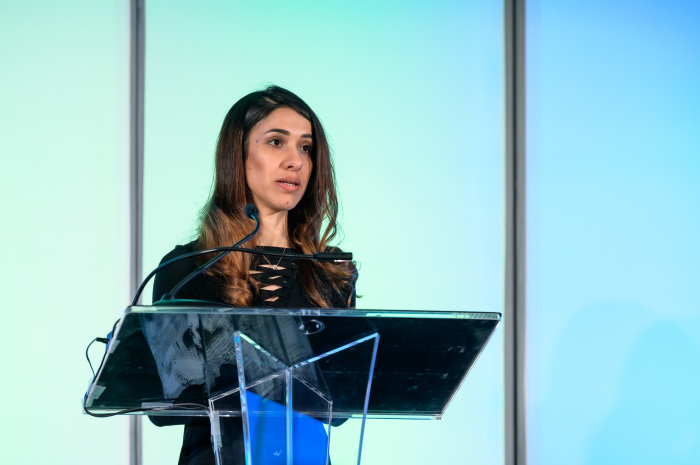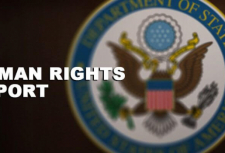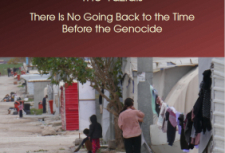Nadia Murad’s Statement on the Change to the Eligibility Requirements for the Yazidi Survivors Law

Recently, the Chair of the Committee announced a change to the eligibility requirements for the Yazidi Survivors Law. The Yazidi Survivors Law is intended to provide reparations and other support for survivors of the genocide and conflict-related sexual violence carried out against the Yazidi community by Islamic State militants in 2014. Now, survivors must file a criminal complaint to apply for reparations. This process is not only time-consuming but can also be retraumatizing for survivors who have a right to reparations.
As a survivor and an advocate, I celebrated when the law was initially adopted, when the first registrations occurred in 2022, and when the first reparation payments were issued. I know intimately what receiving reparations means for the ability of survivors to heal and rebuild their lives. Reparations serve not only as a formal recognition of the trauma we survived but also allow us to support ourselves and our families, pursue our educational or occupational goals, and help to rehabilitate the larger community and region.
Only recently has it been announced that survivors would be required to file an official criminal complaint to be considered eligible for reparations. This change is causing significant problems. While I understand that the intention behind this requirement is to avoid individuals making false claims, I believe that this decision is misguided and unfair to survivors. We want to put the past and our suffering behind us. We want to rebuild our lives. Reparations are essential to our ability to do so. However, many survivors may not have the means to file a criminal complaint. Survivors also may not want their experiences to be shared, given the stigma surrounding such complaints.
The requirement to file a criminal complaint was not part of the original law or the evidence regulations approved by the Iraqi Parliament. Adding it now is revictimizing and stigmatizing, and unnecessarily obstructs access to reparation for those who need it most.
Guidelines and other documents provided by the United Nations on the right to reparation and domestic reparation programs recommend and are designed to assist survivors by making access to reparations fast and affordable, and by requiring a lower standard of evidence and burden of proof. These lowered barriers to access reparation are why survivors are willing to accept reparations through a domestic reparation program and not through a court of law. The reparations system provides an alternative to pursuing claims through the courts, where the standard and burden of evidence are higher, and survivors often incur expensive legal costs and wait years for a resolution.
Countries like Colombia and Peru have led the way in designing and establishing domestic reparation programs, including for survivors of conflict-related sexual violence. In these countries, the standard used is to apply the presumption of good faith, which allows the relevant authorities to contrast the information given by the victims against other pieces of information, such as existing state records. This system presumes that the information is true unless there are reasonable grounds to believe that it is not. It also offers a process for survivors deemed ineligible to appeal the ruling.
I'm proud of the Iraqi government for taking the steps it has so far to provide reparations to survivors. These steps are vital to the recovery process. However, we must not create obstacles for survivors – survivors who badly need reparations in a timely manner. It has been more than eight years since the Yazidi genocide occurred. How much longer must survivors wait
I have called on the Iraqi Prime Minister, the Head of the Legal Counsel, and other relevant authorities to remove the requirement for survivors to file a criminal complaint to be eligible for reparations. This will ensure that survivors can have effective access to reparations and begin to heal from the trauma we have experienced.
Tags: #yazidisinfo #newsyazidis #nadiamurad
Nadia Murad’s Statement on the Change to the Eligibility Requirements for the Yazidi Survivors Law

Recently, the Chair of the Committee announced a change to the eligibility requirements for the Yazidi Survivors Law. The Yazidi Survivors Law is intended to provide reparations and other support for survivors of the genocide and conflict-related sexual violence carried out against the Yazidi community by Islamic State militants in 2014. Now, survivors must file a criminal complaint to apply for reparations. This process is not only time-consuming but can also be retraumatizing for survivors who have a right to reparations.
As a survivor and an advocate, I celebrated when the law was initially adopted, when the first registrations occurred in 2022, and when the first reparation payments were issued. I know intimately what receiving reparations means for the ability of survivors to heal and rebuild their lives. Reparations serve not only as a formal recognition of the trauma we survived but also allow us to support ourselves and our families, pursue our educational or occupational goals, and help to rehabilitate the larger community and region.
Only recently has it been announced that survivors would be required to file an official criminal complaint to be considered eligible for reparations. This change is causing significant problems. While I understand that the intention behind this requirement is to avoid individuals making false claims, I believe that this decision is misguided and unfair to survivors. We want to put the past and our suffering behind us. We want to rebuild our lives. Reparations are essential to our ability to do so. However, many survivors may not have the means to file a criminal complaint. Survivors also may not want their experiences to be shared, given the stigma surrounding such complaints.
The requirement to file a criminal complaint was not part of the original law or the evidence regulations approved by the Iraqi Parliament. Adding it now is revictimizing and stigmatizing, and unnecessarily obstructs access to reparation for those who need it most.
Guidelines and other documents provided by the United Nations on the right to reparation and domestic reparation programs recommend and are designed to assist survivors by making access to reparations fast and affordable, and by requiring a lower standard of evidence and burden of proof. These lowered barriers to access reparation are why survivors are willing to accept reparations through a domestic reparation program and not through a court of law. The reparations system provides an alternative to pursuing claims through the courts, where the standard and burden of evidence are higher, and survivors often incur expensive legal costs and wait years for a resolution.
Countries like Colombia and Peru have led the way in designing and establishing domestic reparation programs, including for survivors of conflict-related sexual violence. In these countries, the standard used is to apply the presumption of good faith, which allows the relevant authorities to contrast the information given by the victims against other pieces of information, such as existing state records. This system presumes that the information is true unless there are reasonable grounds to believe that it is not. It also offers a process for survivors deemed ineligible to appeal the ruling.
I'm proud of the Iraqi government for taking the steps it has so far to provide reparations to survivors. These steps are vital to the recovery process. However, we must not create obstacles for survivors – survivors who badly need reparations in a timely manner. It has been more than eight years since the Yazidi genocide occurred. How much longer must survivors wait
I have called on the Iraqi Prime Minister, the Head of the Legal Counsel, and other relevant authorities to remove the requirement for survivors to file a criminal complaint to be eligible for reparations. This will ensure that survivors can have effective access to reparations and begin to heal from the trauma we have experienced.
Tags: #yazidisinfo #newsyazidis #nadiamurad


























